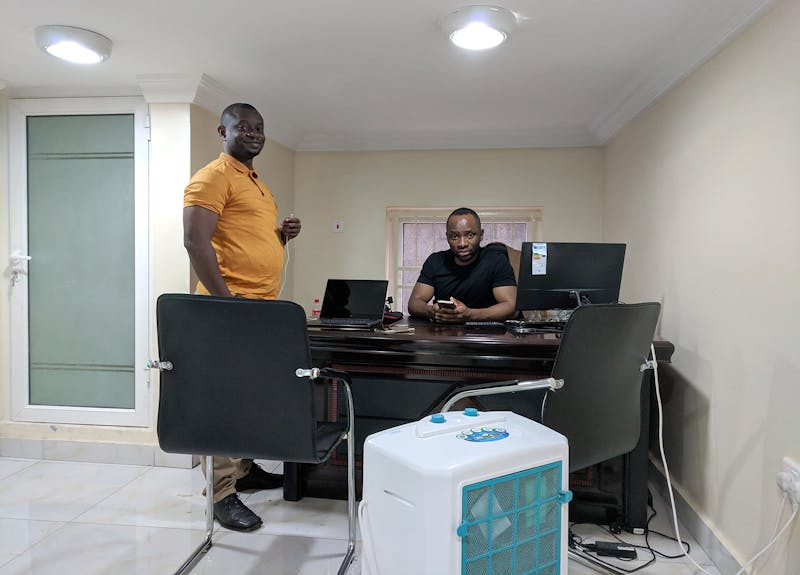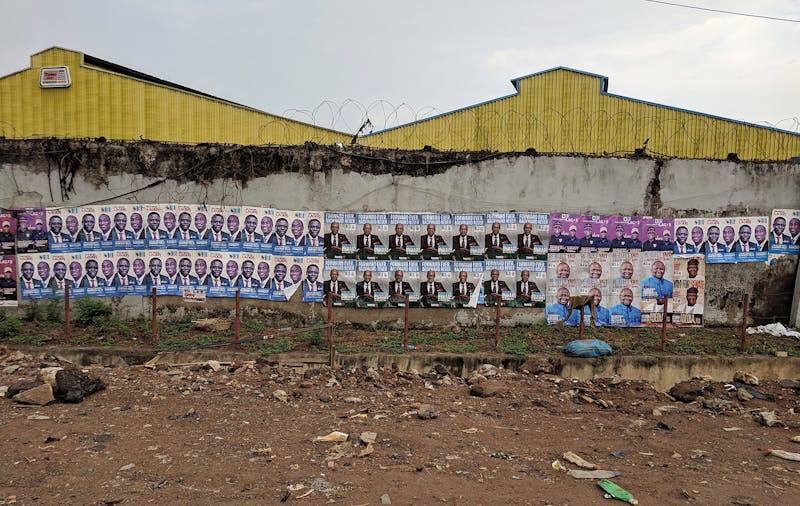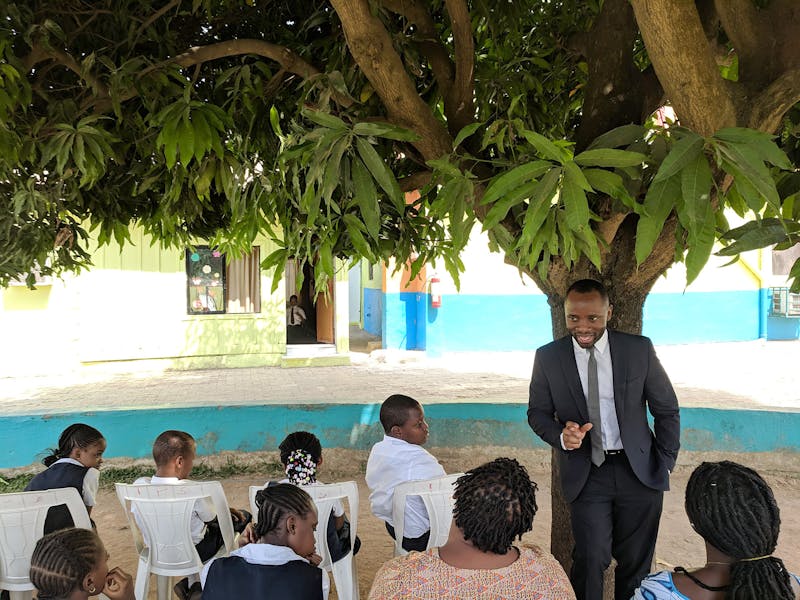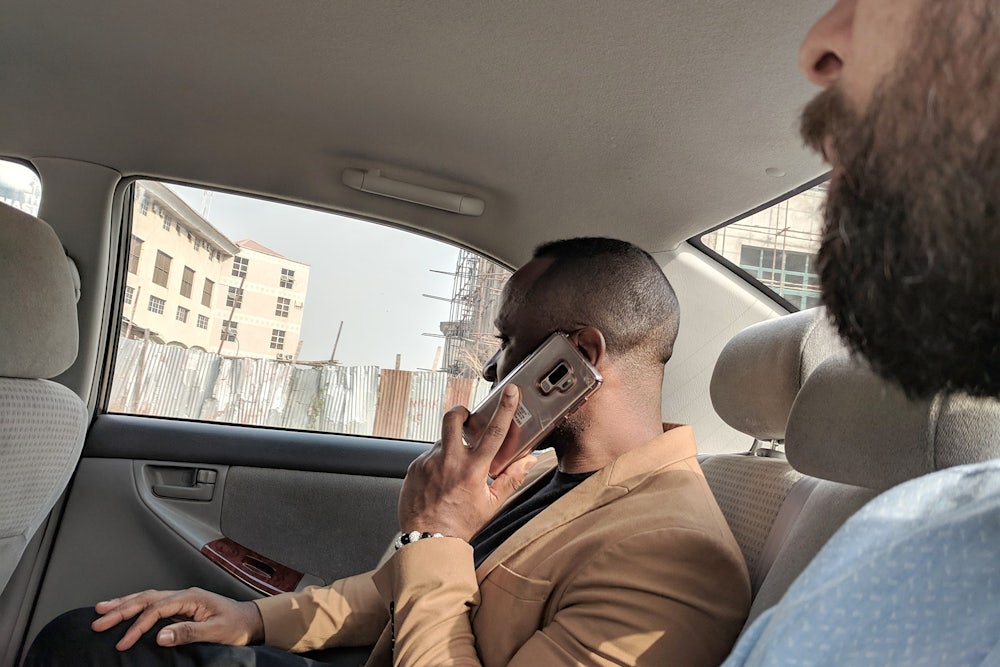One evening last summer, Chike Ukaegbu, a 35-year-old New York tech entrepreneur, called his uncle, Augustine Akalonu: “Are you sitting down?” Ukaegbu asked. Dr. Akalonu was sitting down; he was driving home from his pediatrics practice in the Bronx. Ukaegbu had just been named among the global 100 most influential people of African descent under forty. He had been speaking at conferences around the country and running a lauded tech accelerator in New York. But he wasn’t calling about any of that.
“I’m going to run for president,” Ukaegbu said, a characteristic note of mischief in his voice.
Dr. Akalonu, a jovial man in his mid-sixties with an easy, unhurried manner said, “Great. President of what?”
“Of Nigeria,” replied Ukaegbu.
“I nearly had a car accident,” Dr. Akalonu told me a few months later in November, at a fundraiser he hosted in Nyack, New York. Ukaegbu had become the youngest presidential candidate in Nigerian history.
“Gerontocracy.” That’s the word critics use to describe Nigerian politics. The country has a population of almost 200 million—the largest on the continent, and the youngest: Sixty percent of Nigerians are under age 30, only six percent are older than 60. But government leadership positions are overwhelmingly filled by the aged. This disparity illustrates a broader African trend. In 2017 researchers estimated the median age of the continent’s population was 20, while the average age of a head of state was 62. In May 2018, however, a month after angering Nigerian youth with disparaging comments at an event in London, President Muhammadu Buhari, 75, signed a law lowering the minimum age for presidential candidates from 40 to 35.
Ukaegbu came to the U.S. in 2002 at the age of 19 to study biomedical engineering at the City College of New York. That’s where I first encountered him, although we were not friends and moved in different circles. “I don’t remember all students who participated in our program, but I do remember him,” Nora Heaphy, then a program director for the college’s Colin Powell Fellows in Leadership and Public Service, told me. “He was extremely charismatic, very open to learning, very engaging.” While many fellows went to entry-level jobs at D.C. think tanks upon graduation, she said, Ukaegbu stayed in New York. In 2010, he and a friend he had met at a church concert, Kevaughn Isaacs, launched a non-profit called Re:LIFE, training disconnected youth in Harlem and Washington Heights to develop business plans and helping them complete their education. Ukaegbu himself enrolled in distance learning courses in business management and venture capitalism at Cornell, the University of Pennsylvania, and Stanford, as his plans expanded.
In 2013, Re:LIFE ran its first startup class requiring each trainee to launch a business by the program’s end, and Ukaegbu began noticing what he saw as bias. “I saw several brilliant founders who were not getting funded,” he told me. “And I heard several bullshit stories from investors explaining why they’re not funding these people.” In 2015, he founded Startup52, a Manhattan-based “start-up accelerator” aiming to offer young entrepreneurs from underrepresented demographics intensive coaching in polishing their business plans and investor pitches. Two years later, the accolades for Re:LIFE and Startup52 helped him receive a green card through the United States’ National Interest Waiver category.
“This is the new Nigerian dream,” Damilare Ogunleye, Ukaegbu’s 33-year-old Lagos-based campaign director, told me when we met in Lagos in January. “To leave, embed in the system in the U.S., U.K., or wherever, and skip all the problems of Nigeria.”

Nigerian politics, with its volatile mix of money, violence, and humor, is often surreal. Out of more than 70 candidates who initially declared intent to stand in the presidential election on February 16, 2019, only two have emerged as frontrunners. One is current president Buhari, who due to months’-long medical leaves in the U.K. has had to publicly deny rumors that he has died and been replaced by his double, a hypothetical Sudanese named Jubril. “It’s the real me,” Buhari assured an audience of Nigerian expatriates at a U.N. climate summit in Poland in December. Despite Transparency International placing Nigeria 148th out of 180 countries on a corruption index last year, with scores virtually unchanged during a four-year presidency premised on fighting corruption, Buhari has titled his reelection manifesto Next Level, unironically vowing even greater progress.
Buhari’s chief rival is Atiku Abubakar, a 72-year-old businessman who has been unable to travel to the U.S. since 2005, when an American investigation implicated him in a transatlantic bribery case involving an FBI sting, a telecommunications deal, and $90,000 stashed in a Louisiana congressman’s freezer. Abubakar finally managed a visit to Washington, D.C. in January, reportedly helped by Brian Ballard, a lobbyist with extensive links to the Trump administration. In Nigeria, Abubakar has faced numerous corruption allegations.
“The surest way to riches and power,” former U.S. ambassador Joseph Campbell and Chatham House fellow Matthew Page wrote of Nigeria in 2018, “is through elected office and the opportunities for kleptocratic state capture that it offers.” Successful candidates today are often “godfathered” by prior office holders who have amassed great wealth from public funds, bankrolling party and campaign costs in exchange for a continued cut of national treasure once the sponsored candidate assumes office. Political parties resemble businesses, low on ideology or policy objectives, funded top-down by the godfather, the top office holder, or, during campaigns, by the candidate for highest office.
Ukaegbu’s eccentric campaign began with a chance encounter at a Johns Hopkins School of Advanced International Studies event last April. Ogunleye, who worked on political campaigns while at a Nigerian communications firm from 2012 to 2015, was visiting with a delegation of Lagosian entrepreneurs—he currently runs a T-shirt and mug customization website called Suvenia.com. The two men bonded over a passion for tech innovation: Ukaegbu had been reaching out to Nigerian officials and one presidential candidate with a technology blueprint for the country, a platform politicians could adopt and promote, with no response. “You should run,” Ogunleye told him.
In June, Ukaegbu began holding daily videoconferences from New York with a core team: his older brother Chibueze, who runs a coding academy and software firm in Aba; Ogunleye in Lagos; and a banker in Abuja. The four began planning how to introduce Ukaegbu to voters, raise funds, and obtain a political party nomination, as required by law. They found inspiration, Ogunleye told me, in an Old Testament anecdote in which four lepers, rather than starve in a city besieged by the Syrian army, set out for the Syrian camp, hoping for nourishment or swift death. When they arrive, they find it full of provisions but abandoned: The Syrians heard the thunder of charging chariots and fled in haste. “How do you with four lepers create the sound of chariots?” asked Ogunleye, the sleeves of his suit pinned with card cufflinks featuring the ace of diamonds and ace of spades. “Lead with the media.”
Nigerian news media didn’t bite, but through a contact in D.C. Ukaegbu landed interviews on CNN, BBC, and Al Jazeera. “Everyone got interested,” said Ogunleye. “Who is this guy who is on all these global platforms? What kind of backing does he have?”
In August, after 16 years in New York, Ukaegbu moved back to Nigeria to launch his campaign. Other parties showed up to offer him office nominations and cabinet positions with them—a standard tactic to neutralize political opponents. During one meeting Ogunleye found particularly gratifying, a consultant from Atiku Abubakar’s People’s Democratic Party, eager to demonstrate that the unknown Ukaegbu stood no chance, tapped a bystander. “Do you know this guy?” she asked. The man squinted. “Don’t force yourself,” said the consultant. But the man kept looking at Ukeagbu. “Hey, aren’t you the guy on CNN?” he said. “You’re good.”
At this point, the scrappy #Chike4Nigeria team included Re:LIFE cofounder Isaacs, now a New York high-school teacher of graphic design and photography, producing all campaign graphics during early morning hours and school recess. Ukaegbu’s older brother, Chibueze Ukaegbu Jr., CEO of a coding academy and software firm named LearnFactory Nigeria, contributed personal funds to the campaign’s shoestring budget and directed efforts of his eight full-time and four part-time staffers to building websites, apps, and WhatsApp broadcasts. In New York, Ezinne Kwubiri, head of inclusion and diversity at H&M, worked her contacts to generate media coverage and organize fundraisers, in addition to helping Ukaegbu manage his increasingly chaotic calendar.
By fall, which is when I came across the campaign on social media, Ukaegbu had become the nominee of the new Advanced Allied Party (AAP). AAP chose Safiya Ibrahim Ogoh, a woman from the country’s predominantly Muslim north, as his running mate—balancing out Ukaegbu’s roots in the mostly Christian south.

Ukeagbu’s campaign message is that Nigeria stands at a pivotal point in its trajectory—young, rich in resources, and full of ingenuity, but also undereducated, plagued by conflict and corruption, and underdeveloped. Without leaders committed to aggressive investment in education and technology, he and Ogunleye believe, Nigerians will be crushed by the impending fourth industrial revolution—a revolution Ogunleye perceived signs of in China while on an Alibaba fellowship in 2017. “You think it’s bad now?” Ukaegbu asked a crowd in Philadelphia in November. “Just wait for artificial intelligence,” he said. “That will be real hunger games.”
While not all experts may share Ukaegbu’s and Ogunleye’s tech focus, many would agree that Nigeria is in trouble. In a 2019 analysis, Eurasia Group ranks the Nigerian presidential race among this year’s top ten geopolitical risks, thanks to three probable electoral outcomes: Buhari wins (“an elderly, infirm leader who lacks the energy, creativity, or political savvy to move the needle on Nigeria’s most intractable problems”), Abubakar wins (“another gerontocrat who would focus on enriching himself and his cronies”) or no clear winner emerges (“a dangerous wildcard”). Meanwhile, relentless demographic growth continues. In a 2018 report on “Severely Off-Track Countries,” Brookings projects that by 2030 the number of extremely poor in the nation may reach 160 million.
“Wake up!” says Ukaegbu in one of his campaign videos. “We’re in a fight for our lives, and we don’t even know it.”
One searingly hot day in January, I watched Ukaegbu deliver this message to a group of kids and teachers at a private school in Abuja, in the shade of a mango tree. Ukaegbu introduced himself to each person and remembered their names at question time. Despite his dire warnings, he radiated enthusiasm for what he called “amazing Nigeria.” Ben Dike, a teacher at the school who later invited Ukaegbu to teach a fifth-grade math lesson, asked, “How do you intend to compete with these gladiators?”
Realistically, Ukaegbu doesn’t stand a chance in the upcoming election. (“Who’s that?” asked my driver in Lagos when I told him whom I’d come to cover—a dampening response I had heard more than once.) It doesn’t seem to bother him. Ukaegbu “doesn’t see ceilings,” his cousin Ezemdi Akalonu, a junior at Brown University, told me. His family knows him as a 17-year-old who ran away from home to attend Lagos University instead of the local college prescribed by his parents—enraging his mother, a school principal, and his father, a civil servant and entrepreneur—before looking further afield, to the United States. Now, he’s the local boy made good: His high school in Aba invites him back to speak whenever he visits.

Following the speech at the Abuja school, Ukaegbu and his brother Chibueze decamped to a spartan mezzanine room in a mostly vacant office building. An enormous desk in the otherwise empty, low-ceilinged space, and a bizarrely miniature bathroom gave the room an Alice-in-Wonderland vibe. Chibueze peered into his laptop, working on a website that would allow voters to find young candidates by district. Chike monitored some of the two dozen WhatsApp channels that he said bombard him with “five thousand messages a day.” The lights went off, as frequently happens, until a generator kicked in, and a fan resumed noisily circulating tropical air.
“We’re on the list,” Ukaegbu said, scanning a copy of the roster of presidential candidates, just released by Nigeria’s Independent National Electoral Commission. It was a relief—backroom intrigue and string-pulling, whether from within his own party or elsewhere, could no longer prevent his name from appearing on the ballot.
Despite the early buzz, Ukaegbu’s run has struggled to attract donors. The party, which expected Ukaegbu to bring in the money, is not happy about it. The #Chike4Nigeria team predicted enthusiastic donations from the highly educated diaspora, which remitted home $25 billion in 2018, World Bank data show. According to numbers published by the Center for Social Justice, one tenth of one percent of that sum would match the total for media expenditures made in the 2015 campaign by PDP, the biggest spender and, as the then-governing party with a sitting president, an entity with unrivaled, direct, and unscrutinized access to the country’s oil revenue. But the money hasn’t materialized.
The team has also encountered skepticism from the very Nigerian demographic it hoped would welcome Ukaegbu’s bid: the 18-to-35-year-old voters who make up more than half the electorate. Instead, the most excited supporters have often been retirees, people in their sixties and older.
It’s hard to know how much of that is about the Ukaegbu campaign, and how much of it is about the realities of Nigerian politics. When I asked Matthew Page whether he could imagine an outsider, even a well-resourced one, mounting a successful presidential bid without established patronage-client relationships, he seemed unconvinced. “I think we’re a few decades away from that,” he said.
As I was boarding a flight back to New York in late January, Ukaegbu called me. He sounded tired. For days he had been trying to connect me with his vice-presidential pick, but she kept demurring. Two nights before, at a tense party meeting in a Stygian room in Abuja, I had watched him square off against members who wanted to declare support for Buhari and catch the last trickle of cash from the dwindling stream of the ruling party’s electoral funds. I asked whether he felt discouraged. He said he did not. “It’s certainly been an education,” he told me on the call. “It’s been like a PhD in Nigerian politics.”
